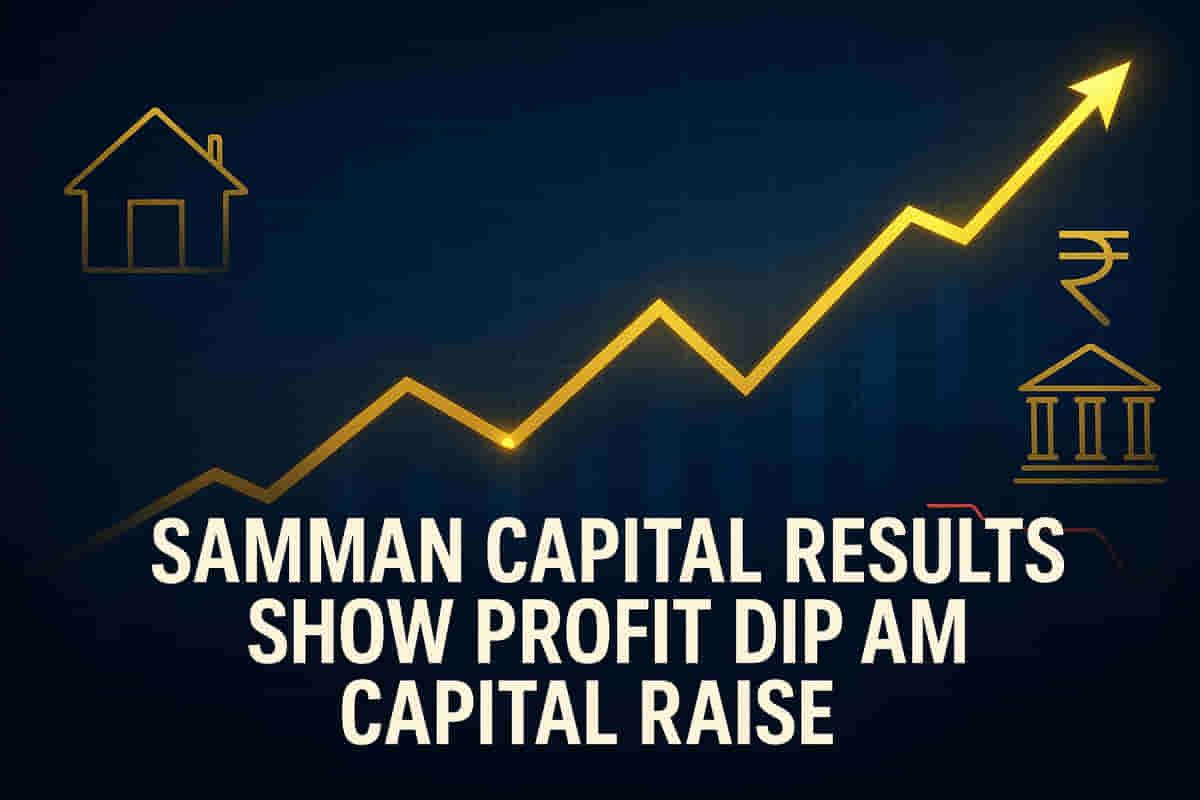Sammaan Capital Reports 7.6% Sequential Profit Decline, Raises ₹1,250 Crore Capital
Banking/Finance
|
Updated on 31 Oct 2025, 10:33 am
Reviewed By
Aditi Singh | Whalesbook News Team
Short Description :

▶
Stocks Mentioned :
Detailed Coverage :
Sammaan Capital Ltd announced its financial results for the quarter ending September 2025. The company posted a net profit of ₹309 crore, marking a 7.6% sequential decline from ₹334.3 crore in the June 2025 quarter. Revenue from operations saw a year-on-year decrease of 6.2%, totaling ₹2,251 crore compared to ₹2,400.3 crore in the same period last year.
During the quarter, Sammaan Capital successfully completed a preferential issue, raising ₹1,250 crore through equity shares and warrants. This issuance expanded the company’s total equity capital to ₹2,192 crore.
The company's financial stability remains strong, with a capital adequacy ratio reported at 36.3% as of September 30, 2025. The net non-performing asset (NPA) ratio stood at a manageable 1.9%. The loan book is primarily retail-focused, concentrating on affordable home loans, loans against property, and co-lending with banks. Over 75% of its growth book comprises residential property loans, geographically diversified across India. The company targets self-employed professionals, small business owners, and salaried employees with a median annual income of approximately ₹16 lakh. Loan-to-value (LTV) ratios are moderate, with average home loans at 70% LTV and MSME loans against property at 55% LTV.
Additionally, Sammaan Capital's board approved the potential issuance of secured, redeemable, non-convertible debentures up to ₹5,000 crore via private placement, subject to market conditions.
Impact: This news provides a direct insight into the financial performance and strategic capital management of a listed housing finance company. While profitability saw a sequential dip, the significant capital raise and strong financial ratios suggest resilience. Investors will assess these factors for future performance, potentially influencing the stock's valuation and sentiment. Impact Rating: 6/10
Heading: Difficult Terms and Their Meanings Net profit: The profit remaining after all expenses and taxes have been deducted from revenue. Revenue from operations: The income generated from the company's primary business activities. Sequential decline: A decrease in value from one reporting period to the next consecutive period (e.g., quarter-over-quarter). Year-on-year decline: A decrease in value compared to the same period in the previous year. Preferential issue: A method of raising capital where a company allots shares or warrants to a select group of investors at a specific price, rather than through a public offering. Equity shares: Ordinary shares of a company that represent ownership. Warrants: Securities that give the holder the right, but not the obligation, to purchase a company's stock at a specific price within a certain timeframe. Capital adequacy ratio (CAR): A measure of a bank's or financial institution's capital in relation to its risk-weighted assets. A higher CAR indicates greater financial stability. Net non-performing asset (NPA) ratio: The percentage of loans that are in default (non-performing) after deducting provisions for losses. A lower NPA ratio indicates better loan quality. Loan book: The total amount of loans issued by a financial institution. Affordable home loans: Home loans designed for borrowers with lower incomes, often with more favorable terms. Loans against property (LAP): Loans where a property is used as collateral. Co-lending partnerships: Agreements where two or more lenders share the risk and return of a loan. Residential property loans: Loans specifically for the purchase or construction of residential properties. Loan-to-value (LTV) ratio: The ratio of the loan amount to the appraised value of the property, expressed as a percentage. MSME: Micro, Small, and Medium Enterprises. Secured, redeemable, non-convertible debentures (NCDs): Debt instruments that are secured by assets, can be redeemed by the company, and do not convert into equity shares. Private placement: Selling securities directly to a select group of investors rather than through a public offering.
More from Banking/Finance

Banking/Finance
SEBI is forcing a nifty bank shake-up: Are PNB and BoB the new ‘must-owns’?
Latest News

Auto
Suzuki and Honda aren’t sure India is ready for small EVs. Here’s why.

Brokerage Reports
Stocks to buy: Raja Venkatraman's top picks for 4 November

Mutual Funds
Quantum Mutual Fund stages a comeback with a new CEO and revamped strategies; eyes sustainable growth

Tech
Why Pine Labs’ head believes Ebitda is a better measure of the company’s value

Industrial Goods/Services
India’s Warren Buffett just made 2 rare moves: What he’s buying (and selling)

Startups/VC
a16z pauses its famed TxO Fund for underserved founders, lays off staff
Renewables Sector

Renewables
Brookfield lines up $12 bn for green energy in Andhra as it eyes $100 bn India expansion by 2030
Energy Sector

Energy
India's green power pipeline had become clogged. A mega clean-up is on cards.
Renewables Sector

Brookfield lines up $12 bn for green energy in Andhra as it eyes $100 bn India expansion by 2030
Energy Sector
